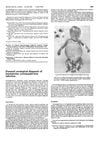 42 citations,
December 2016 in “Cell Death & Differentiation”
42 citations,
December 2016 in “Cell Death & Differentiation” Damaging mitochondrial DNA in mice speeds up aging due to increased reactive oxygen species, not through the p53/p21 pathway.
 41 citations,
July 2015 in “Current Drug Discovery Technologies”
41 citations,
July 2015 in “Current Drug Discovery Technologies” Some plants may help with hair growth and have fewer side effects than synthetic drugs, but more research is needed to confirm their effectiveness.
 41 citations,
September 2014 in “Journal of Pharmacy and Pharmacology”
41 citations,
September 2014 in “Journal of Pharmacy and Pharmacology” Melatonin may help treat PCOS symptoms in rats.
 41 citations,
June 2010 in “Clinics in Dermatology”
41 citations,
June 2010 in “Clinics in Dermatology” Smoking harms skin health, causing slower wound healing, more wrinkles, and worsening some skin conditions, but may protect against certain others.
 41 citations,
March 2007 in “Journal of dermatological science”
41 citations,
March 2007 in “Journal of dermatological science” Taking L-cystine and vitamin B6 can prevent hair loss caused by smoke in mice.
 40 citations,
August 2006 in “Current Drug Safety”
40 citations,
August 2006 in “Current Drug Safety” Some drugs can cause hair loss, excessive growth, or color changes, often reversible but sometimes permanent.
 40 citations,
October 2002 in “Endocrinology”
40 citations,
October 2002 in “Endocrinology” Vitamin D3 analogs can promote hair growth in mice genetically prone to hair loss.
 39 citations,
March 2018 in “Archives of Dermatological Research”
39 citations,
March 2018 in “Archives of Dermatological Research” Androgens may block hair growth signals, targeting this could treat hair loss.
 39 citations,
June 1982 in “The BMJ”
39 citations,
June 1982 in “The BMJ” Blood tests confirmed a baby in the womb had a CMV infection.
 38 citations,
July 2021 in “ACS Nano”
38 citations,
July 2021 in “ACS Nano” Microneedles help treat hair loss by improving hair surroundings and promoting growth.
 38 citations,
February 2009 in “Journal of The European Academy of Dermatology and Venereology”
38 citations,
February 2009 in “Journal of The European Academy of Dermatology and Venereology” Severe vertex pattern hair loss may indicate a higher risk for artery plaque buildup.
 37 citations,
January 2010 in “Internal Medicine”
37 citations,
January 2010 in “Internal Medicine” A woman's liver was damaged by taking the herbal supplement Shou-Wu-Pian, but it got better after she stopped using it.
 36 citations,
November 2009 in “Journal of Investigative Dermatology”
36 citations,
November 2009 in “Journal of Investigative Dermatology” Prolactin may affect hair growth differently based on gender and scalp area.
 34 citations,
January 2008 in “International Review of Neurobiology”
34 citations,
January 2008 in “International Review of Neurobiology” Epilepsy and certain epilepsy drugs can lead to reproductive problems in women, but changing medication might improve these issues.
 34 citations,
July 1987 in “The Journal of dermatologic surgery and oncology”
34 citations,
July 1987 in “The Journal of dermatologic surgery and oncology” Improved dermabrasion techniques in 1987 led to better treatment results for skin issues like acne scars.
 33 citations,
September 2012 in “Australasian Journal of Dermatology”
33 citations,
September 2012 in “Australasian Journal of Dermatology” Chemotherapy can cause hair changes similar to alopecia areata, which might lead to misdiagnosis.
 32 citations,
February 2016 in “Journal of Dermatology”
32 citations,
February 2016 in “Journal of Dermatology” Dutasteride safely promotes hair growth and reduces hair loss, with mild side effects.
 32 citations,
January 2007 in “KARGER eBooks”
32 citations,
January 2007 in “KARGER eBooks” Severe insulin resistance can be managed with medication, lifestyle changes, and treatment for related conditions.
 31 citations,
May 2021 in “Journal of endocrinological investigation”
31 citations,
May 2021 in “Journal of endocrinological investigation” APS-1 in Italy shows diverse AIRE mutations and various autoimmune issues.
 30 citations,
March 2011 in “Australasian Journal of Dermatology”
30 citations,
March 2011 in “Australasian Journal of Dermatology” Flutamide improves female hair loss when other treatments fail, but may cause liver toxicity.
 30 citations,
April 2010 in “Cell Cycle”
30 citations,
April 2010 in “Cell Cycle” The gene p53 is crucial for removing damaged cells to allow for healthy tissue renewal.
 28 citations,
December 2019 in “Skin appendage disorders”
28 citations,
December 2019 in “Skin appendage disorders” Some medications might reverse gray hair, especially those that reduce inflammation or stimulate pigment production, and vitamin B might help.
 27 citations,
March 2018 in “Fertility and Sterility”
27 citations,
March 2018 in “Fertility and Sterility” Women with PCOS who had antiandrogenic treatment before pregnancy had fewer complications than those without treatment.
 26 citations,
March 2015 in “Phytotherapy Research”
26 citations,
March 2015 in “Phytotherapy Research” Forsythiaside-A, a natural substance, can protect against hair loss and is more effective than current treatments, potentially making it a good option for hair loss treatment.
 26 citations,
July 2003 in “Journal of Cutaneous Medicine and Surgery”
26 citations,
July 2003 in “Journal of Cutaneous Medicine and Surgery” Minoxidil solution safely and effectively treats hair loss.
 25 citations,
September 2018 in “Scientific Reports”
25 citations,
September 2018 in “Scientific Reports” Morroniside may help hair grow and stay in its growth phase by affecting certain cell signals.
 24 citations,
November 2016 in “Cell death and disease”
24 citations,
November 2016 in “Cell death and disease” Skin-derived stem cells can become various cell types, including germ cell-like and oocyte-like cells.
 24 citations,
July 1987 in “Dermatologic Clinics”
24 citations,
July 1987 in “Dermatologic Clinics” Systemic diseases can cause hair loss, which is often reversible with treatment.
 23 citations,
February 2015 in “International Journal of Molecular Sciences”
23 citations,
February 2015 in “International Journal of Molecular Sciences” Colchicine can inhibit hair growth by affecting cell activity and protein expression in hair follicles.
 22 citations,
January 2014 in “Biological & Pharmaceutical Bulletin”
22 citations,
January 2014 in “Biological & Pharmaceutical Bulletin” Ginsenoside F2 may help prevent hair loss and promote hair growth better than finasteride.





























